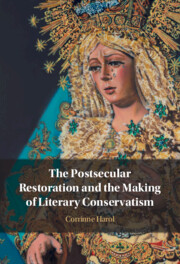Book contents
- The Postsecular Restoration and the Making of Literary Conservatism
- The Postsecular Restoration and the Making of Literary Conservatism
- Copyright page
- Contents
- Acknowledgments
- Introduction
- Part I Political and Fictional Relations
- Chapter 1 Faith
- Chapter 2 Indulgence
- Part II Postsecular Literary Experiences
- Part III Political Agents and Novel Forms
- Bibliography
- Index
Chapter 2 - Indulgence
The Stuart Declarations of Indulgence and Their Afterlives
from Part I - Political and Fictional Relations
Published online by Cambridge University Press: 22 June 2023
- The Postsecular Restoration and the Making of Literary Conservatism
- The Postsecular Restoration and the Making of Literary Conservatism
- Copyright page
- Contents
- Acknowledgments
- Introduction
- Part I Political and Fictional Relations
- Chapter 1 Faith
- Chapter 2 Indulgence
- Part II Postsecular Literary Experiences
- Part III Political Agents and Novel Forms
- Bibliography
- Index
Summary
“Indulgence: The Stuart Declarations of Indulgence and Their Afterlives,” analyzes the concept and procedure of indulgence during the Restoration and its persistence in the eighteenth century. It argues that the Stuart Declarations of Indulgence as mechanisms of religious liberty were not superseded by toleration; rather, they articulated a formal and affective structure for political and personal relations that persisted as a minor form in the eighteenth century, as exemplified in the writing of David Hume, Edmund Burke, Samuel Richardson, and Olaudah Equiano. While tolerance is a policy and a practice grounded in a theory of formal equality, indulgence persists as a way to imagine relationships with women, with children, and with enslaved and colonized people.
- Type
- Chapter
- Information
- Publisher: Cambridge University PressPrint publication year: 2022

